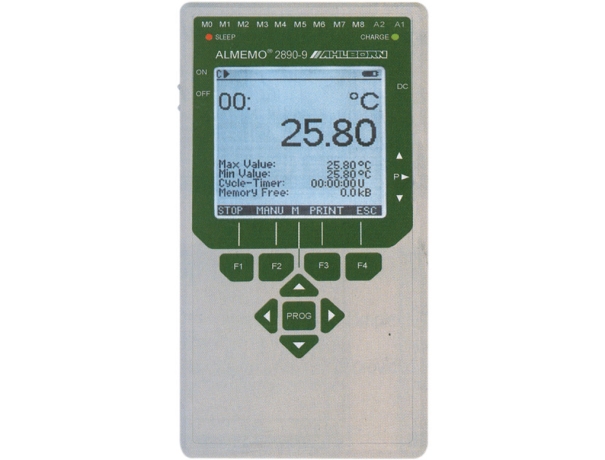AHLBORN GERMANY UNIVERSAL DATA Logger Allow measurement and storage of data of almost any measured physical parameter: Temperature, humidity, flow, pressure, force, displacement, velocity, meteorology, lighting, voltage and power.
A huge variety of sensors that allow you to measure and store data: temperature sensors, humidity, pressure and force transducers, displacement sensors (also for buildings), wind speed, radiation, current pliers and more.
From temperature and humidity to pH levels and pressure, data loggers offer a convenient and efficient way to track environmental conditions and ensure compliance with regulatory standards
Importance of Data Loggers in Laboratories
Data loggers are indispensable tools in laboratories for several reasons:
Ensuring Accurate Data Collection:
One of the primary functions of data loggers is to ensure the accuracy and reliability of data collected during experiments and research activities. By continuously monitoring parameters such as temperature, humidity, and pressure, data loggers help researchers maintain the integrity of their data and minimize the risk of errors.
Monitoring Environmental Conditions:
Many experiments and processes in laboratories are sensitive to environmental conditions. Data loggers allow researchers to monitor and control factors such as temperature and humidity, ensuring optimal conditions for experiments and preventing any adverse effects on results.
Compliance with Regulations:
In regulated industries such as pharmaceuticals and food production, strict guidelines govern the storage and handling of materials. Data loggers help laboratories comply with these regulations by providing documented evidence of environmental conditions and ensuring that storage conditions meet the required standards.
Factors to Consider When Choosing Data Loggers for Laboratories
When selecting data loggers for laboratory use, several factors should be taken into account:
Accuracy and Precision:
The accuracy and precision of data loggers are crucial for obtaining reliable measurements. It's essential to choose loggers with high-quality sensors and calibration procedures to ensure accurate results.
Measurement Range:
Different experiments and processes require data loggers with varying measurement ranges. It's important to select loggers that can accurately measure the desired parameters within the required range.
Data Storage Capacity:
The storage capacity of data loggers determines the amount of data that can be recorded before needing to offload or archive it. For long-term experiments or monitoring projects, loggers with large storage capacities are essential to prevent data loss.
Battery Life:
Battery life is another critical factor, especially for standalone and wireless data loggers. Long-lasting batteries ensure uninterrupted monitoring and reduce the need for frequent battery replacements, which can be costly and time-consuming.
Applications of Data Loggers in Laboratories
Data loggers find wide-ranging applications in laboratories across various industries:
Temperature Monitoring:
In pharmaceutical and food laboratories, precise temperature control is essential for maintaining the stability of products and ensuring the efficacy of experiments.
Humidity Monitoring:
Humidity levels can impact the quality of materials and the success of experiments, making humidity monitoring crucial in environmental chambers, cleanrooms, and storage facilities.
pH Monitoring:
In chemical and biological laboratories, pH monitoring is vital for maintaining the pH balance of solutions and optimizing reaction conditions.
Pressure Monitoring:
Pressure-sensitive processes such as fermentation and cell culture require accurate pressure monitoring to ensure optimal conditions and prevent equipment damage.
